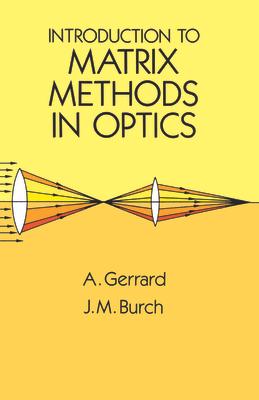This book was designed to encourage the adoption of simple matrix methods in teaching optics at the undergraduate and technical college level. Although these methods have been somewhat neglected in the past, the authors point to the economy and elegance with which, for a linear system, a wealth of input-output relations can be expressed by a single matrix. Moreover, the field of optics has been enormously enriched by contributions from other disciplines, such as microwave physics and electrical engineering, which employ matrix methods.
Because it is an introductory text, this work requires little prior knowledge and is confined to just two topics: paraxial imaging and polarization. For those with no previous acquaintance with matrix algebra, Chapter One introduces basic ideas of rectangular matrix arrays and gives the rules for adding them and for forming matrix products. Subsequent chapters deal with paraxial imaging properties of a centered optical system, optical resonators and laser beam propagation, matrices in polarization optics, and propagation of light through crystals.
Six helpful appendixes deal with such topics as aperture properties of centered lens systems, matrix representation of centering and squaring errors, and derivation of Mueller and Jones matrices. A bibliography completes this accessible guide to methods that will be of great assistance to students and workers not only in optics, but in such areas as laser engineering, optoelectronics, mechanical engineering, and more. 1975 edition.

Introduction to Matrix Methods in Optics
This book was designed to encourage the adoption of simple matrix methods in teaching optics at the undergraduate and technical college level. Although these methods have been somewhat neglected in the past, the authors point to the economy and elegance with which, for a linear system, a wealth of input-output relations can be expressed by a single matrix. Moreover, the field of optics has been enormously enriched by contributions from other disciplines, such as microwave physics and electrical engineering, which employ matrix methods.
Because it is an introductory text, this work requires little prior knowledge and is confined to just two topics: paraxial imaging and polarization. For those with no previous acquaintance with matrix algebra, Chapter One introduces basic ideas of rectangular matrix arrays and gives the rules for adding them and for forming matrix products. Subsequent chapters deal with paraxial imaging properties of a centered optical system, optical resonators and laser beam propagation, matrices in polarization optics, and propagation of light through crystals.
Six helpful appendixes deal with such topics as aperture properties of centered lens systems, matrix representation of centering and squaring errors, and derivation of Mueller and Jones matrices. A bibliography completes this accessible guide to methods that will be of great assistance to students and workers not only in optics, but in such areas as laser engineering, optoelectronics, mechanical engineering, and more. 1975 edition.